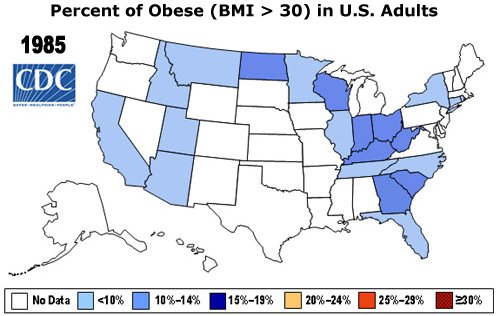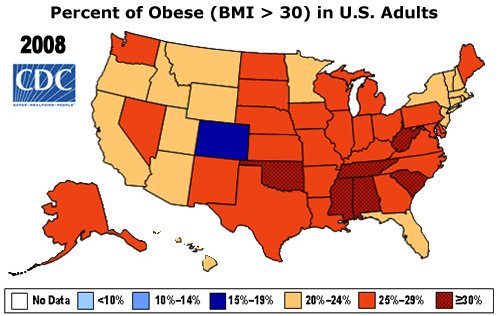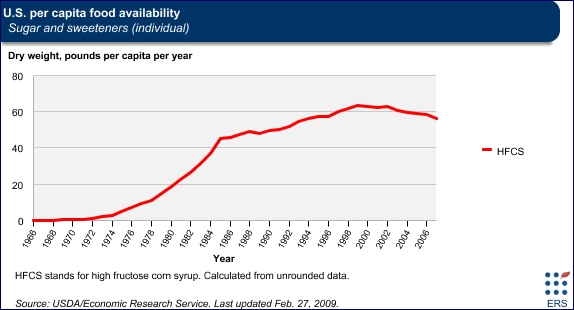The Obesity Puzzle
Obesity and well-being are not just a matter of carbs/no-carbs; the causal chain is not that simple.




I’ve attached a YouTube film of a lecture by Dr. Robert Lustig, head of Pediatric Endocrinology at UCSF Medical School. This is an explanation of the biological--and political--mechanism that causes obesity and Type 2 diabetes, and why they’ve become an epidemic.We were fortunate to find Dr. Lustig when my younger son, Pat was an adolescent. Pat was a very heavy boy who gained weight despite being vigorously active (for example, he played water polo year round) and really not eating that much. I finally persuaded Pat’s pediatrician that there was something wrong with the boy’s metabolism. Pat’s blood test showed he had cholesterol and triglyceride counts that would be extreme for an obese 60-year-old--into the high 300’s.
There were no pediatric endocrinologists in our area at that time, so we were sent to UCSF. Dr. Lustig enrolled Pat in a study which I think is still ongoing. The upshot: cut out all fructose, and obesity and all its symptoms subside.
Pat, now 20, weighs 25 pounds LESS than he did in the 8th grade, although he is six inches taller. People literally do not recognize him. It is a very gratifying and amazing transformation. It was simple, but not easy. Pat worked very hard, and for a while was assisted with metformin. (He is now off the drug, and shows no ill effects or relapsed weight gain or high cholesterol or triglycerides.) But mostly it was about shunning all fructose, especially in drinks.
Fructose is addictive for the same reasons, by the same mechanisms, and producing many of the same pathologies as alcohol, as Dr. Lustig explains in the lecture. One of his catch phrases is: “Fructose is alcohol without the buzz.”
It’s 90 minutes. Stick with it. It’s a little dense in spots, but overall, it is a compelling story. Dr. Lustig puts it all in context. I know he and Michael Pollan are aware of each other, though when I asked him he said they haven’t had any formal collaboration. But their views of our food delivery system are totally aligned.
I’m hoping that once you see this, you will feel that it deserves a wider audience.
She found that her subjects consumed about six times as many beans a day as Americans, ate fish twice a week and meat five times a month, drank on average two to three cups of coffee a day and took in about a quarter as much refined sugar — the elderly did not like soda. She also discovered they were consuming high levels of olive oil along with two to four glasses of wine a day.
Social structure might turn out to be more important. In Sardinia, a cultural attitude that celebrated the elderly kept them engaged in the community and in extended-family homes until they were in their 100s. Studies have linked early retirement among some workers in industrialized economies to reduced life expectancy.
In Okinawa, there’s none of this artificial punctuation of life. Instead, the notion of ikigai — “the reason for which you wake up in the morning” — suffuses people’s entire adult lives. It gets centenarians out of bed and out of the easy chair to teach karate, or to guide the village spiritually, or to pass down traditions to children. The Nicoyans in Costa Rica use the term plan de vida to describe a lifelong sense of purpose. As Dr. Robert Butler, the first director of the National Institute on Aging, once told me, being able to define your life meaning adds to your life expectancy.
I was in Germany a month ago and noticed (1) the grocery stores no longer look like markets but rather supermarkets with all the brightly colored packages of processed food, and (2) the Germans are getting fat.
I am wholly convinced now that hidden carbs--not the potatoes and rice but the carbs in the processed foods--are what is putting on the pounds. After months of pondering why I was struggling to control weight despite some effort and listening to an econtalk podcast on the evils with carbs (and containing a nice dose of real biochemical flavor to the discussion), I dropped the carbs and dropped 30 lbs within 6 months.
In this Econtalk podcast (time: 1:20) Taubes on Why We Get Fat, author Gary Taubes presented some interesting rat studies along with the following model: (1) carbs trigger insulin, (2) insulin triggers fat deposition, (3) insulin with carb depletion triggers carb craving (after dinner foraging). I think the complex vs simple carb issue finally makes sense to me also. Simple carbs spike the insulin but the complex carbs are released more slowly and thus spike the insulin less. We eat carbs AND fat with the carbs sending the fat to the muffin top. The Asian diet may be carb-rich/fat poor.
SPECIAL OFFER ON GREEN COFFEE BEANS FOR LONG-TERM STORAGE FROM EVERLASTING SEEDS: Here is a note from ES's founder: "I've successfully stabilized green coffee beans for a period of six years and still had them roast up to within 90-95% of their 'new' bouquet, smoothness, and flavour characteristics. We've finally got all of the odds and ends together, along with the best 'stove top' roaster {Whirley Pop} that we're found. The coffee beans are all 100% Organic: Peruvian, Colombian, and Guatamalean in two sizes, 1 lb. And 5 lbs. the sealed cans contain a small 'Roasting Guide' that gives basic instructions, roasting times and temps, etc. This is, by necessity, only a brief intro with the essential information, as it has to fit into our smaller, 'chowder' size can.
It's taken me nearly ten years to experiment, wait, and finally find a method that would preserve the bean's natural flavours and oils. The other thing that suggested itself to me is that I can think of few things, outside of the obvious 'necessities' {Bible, beans, bullets} that would be more valuable, command a higher price, and be virtually instantly 'tradeable' anywhere, anytime after an 'event': coffee is, in a multitude of ways, our latter day 'comfort food.'"
My new book Why Things Are Falling Apart and What We Can Do About It is now available in print and Kindle editions--10% to 20% discounts.
 1. Debt and financialization
1. Debt and financialization2. Crony capitalism and the elimination of accountability
3. Diminishing returns
4. Centralization
5. Technological, financial and demographic changes in our economyComplex systems weakened by diminishing returns collapse under their own weight and are replaced by systems that are simpler, faster and affordable. If we cling to the old ways, our system will disintegrate. If we want sustainable prosperity rather than collapse, we must embrace a new model that is Decentralized, Adaptive, Transparent and Accountable (DATA).
We are not powerless. Not accepting responsibility and being powerless are two sides of the same coin: once we accept responsibility, we become powerful.
10% discount on the Kindle edition: $8.95(retail $9.95) print edition: $24 on Amazon.com
To receive a 20% discount on the print edition: $19.20 (retail $24), follow the link, open a Createspace account and enter discount code SJRGPLAB. (This is the only way I can offer a discount.)
| Thank you, Erle H. ($36.72), for your wondrously generous contribution to this site -- I am greatly honored by your support and readership. | Thank you, Michael V. ($60), for your superbly generous contribution to this site -- I am greatly honored by your steadfast support and readership. |



























